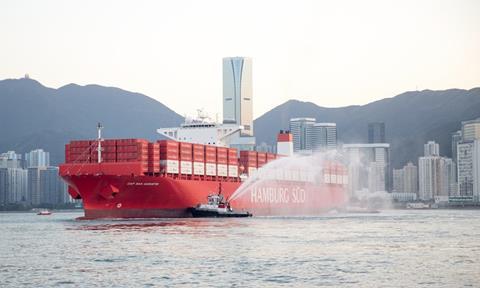
Maersk-Hamburg Süd has confirmed it will maintain a Cherry Express service in the 2021/22 Chilean cherry season, despite current global supply chain disruption.
The group’s Cherry Express service will include two vessels, with sailings scheduled for week 51 and week 52 respectively. They will depart Chile’s San Antonio port and berth in Hong Kong within 22-23 days. Shipments will reach China ahead of the all-important Spring Festival celebrations, with Chinese New Year falling on 1 February in 2022.
“Each vessel has a capacity of around 815 plugs, and we’re planning to use approximately 70 per cent of the capacity,” Boris Aljaro, Maersk’s head of fruit and vegetables for West Coast South America, told Fruitnet.
This proportion equates to a total of more than 1,100 reefer containers across both vessels.
While Maersk-Hamburg Süd offered seven sailings under its Cherry Express service in 2020/21, the schedule has been scaled back this season, partly due to the earlier timing of Chinese New Year but also because of global logistics disruption. Aljaro admitted it has taken a great deal of planning to secure sufficient reefer container capacity to run the service.
“We’ve had to reposition the containers in San Antonio to secure enough units in time for the Chilean cherry season,” he told Fruitnet.
Despite those measures, Aljaro predicts an overall shortage of reefer containers this season. “The container capacity in the region has been limited over the past six months and the situation today is no different. It’s difficult to put a number on the shortage of available containers, but it’s likely to be between 20 and 30 per cent.”
In addition to reefer container shortages, the repositioning of empty dry containers to China will further impact the capacity of the Cherry Express vessels, he adds.
“The carriers are giving first priority to empty dry containers due to the higher import rate as the market is paying spot prices of US$15,000 and more for these containers,” Aljaro explained. “The Express vessels are using a significant part of their capacity to load empty dry containers, impacting the availability of ‘reefer’ plugs.”
With limited container availability, freight rates for Chilean cherry shippers will be significantly higher than last year, he confirmed.
The earlier date of Chinese New Year will compound pressure on the logistics of shipping cherries to China this season, particularly as Chilean production is expected to ramp up.
“There’s always a bottleneck in weeks 49-51, and this year there will be even more stress on the supply chain because Chinese New Year falls on 1 February and the processing capacity will increase by 30 per cent, increasing the peak dramatically,” said Aljaro.
He admitted there is some uncertainty over the Chilean campaign in China following heavy disruption to the 2020/21 sales season resulting from unproven claims that Covid-19 had been detected in the inner packaging of a consignment of Chilean cherries.
But Aljaro is hopeful the industry can recover from the crisis in 2022. “There is always some uncertainty in China. Last year, it was Covid-19. This year, it could be something else, but I hope it is normal.”
This article appears in Fresh Focus Cherry 2022, distributed to all subscribers of Asiafruit, Eurofruit and Produce Plus. To order your copy, email subscriptions@fruitnet.com






No comments yet